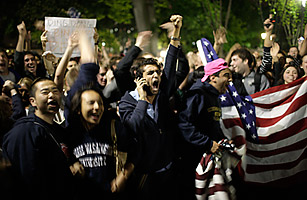
When President Barack Obama announced on May 1 that U.S. forces had killed Osama bin Laden in Pakistan, I was among those who headed to the White House. The mood in Lafayette Park was joyous, ebullient, cathartic — though hardly the bacchanal of vengeful jingoism that some in the media have portrayed it to be, or an expression of “orgasmic euphoria in news of bloodshed” as David Sirota claimed on Salon.com. An outsider would have been struck by the crowd’s diversity, by now so familiar to Americans that we barely notice it. I’d guess that a plurality of the flag wavers were white, but I saw plenty of exuberant black, Asian, Latino and multiracial faces too. An elated young Muslim American, wearing a headscarf, enthused to a television crew about the sense of unity and belonging she felt with those around her. The whole scene would have bewildered bin Laden as much as it would have repelled him. And it goes a long way toward explaining why his war on America was doomed to fail.
Bin Laden’s goal on Sept. 11, 2011, wasn’t merely to murder as many innocent Americans as possible. To his followers, bin Laden predicted that the U.S. would overreact to the attacks and allow itself to be drawn into an endless, enervating conflict with the Muslim world. He believed al-Qaeda could bleed America into bankruptcy. Like the U.S.S.R. before it, the U.S. was a spent empire, a soft superpower, “a weak horse.” As the terrorism expert Daveed Gartenstein-Ross writes, bin Laden believed that “just as the Arab fighters and Afghan mujahidin had destroyed Russia economically, al-Qaeda was now doing the same to the United States.”